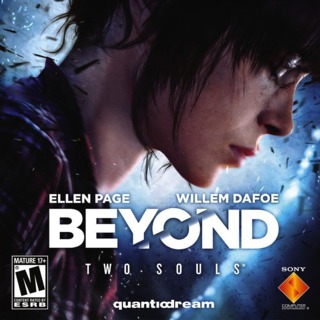Imagine if David Cage directed the 1990 movie Ghost, and you'll essentially have Beyond: Two Souls.
The Good: Top-notch voice acting; gorgeously smooth and detailed graphics; moving, comprehensive story; complex and well-written characters; clever use of of the "two souls" aspect of gameplay
The Bad: Occasional camera awkwardness; the "BIG REVEAL" feels rushed and unsatisfying; player choices are mostly meaningless until near the end
There's a point in this game where (no spoilers, promise) the player can eavesdrop on a psychiatric patient obsessed with getting every single detail right. My theory is that this patient is the graphical developer of this game; even among recent cinematic wonders, such as The Last of Us and GTA V, Beyond: Two Souls stands out as something damn near a work of art. The amount of attention to detail in every little graphical nuance is stunning; from the tiniest facial expressions to grandiose bursts of action, this is a game worthy of cinema.
Cinematic videogames are known for their heavy emphasis on storytelling rather than adrenaline-pumping action. While Beyond: Two Souls certainly falls into that category, it has also transcended the stereotype by providing genuinely pulse-pounding moments in between slow scenes built for plot development--and occasionally mixes the two together in perfect harmony. The story is so engrossing that an act as simple as getting dinner ready for a guest can make your palms sweat with anticipation: will this fictional character like the food I cooked? Can I finish it in time? Oh, crap, I pressed X when I should have pressed O!!! The story element is one of Beyond's strongest points, with its greatest hiccup being the surprise revelations near the end; while bittersweet, they feel somewhat rushed and bland, as if we've seen them before many times (and in one case, we have).
The controls in Beyond very much resemble director David Cage's previous work, Heavy Rain. Though we can now use the joystick to walk ( instead of L2; thank God they learned from that mistake), the vast majority of the game is played through quick-time events: you use the joystick to dodge incoming projectiles (among other things), you hammer the X button to run away from impending doom, and so on. This type of gameplay may feel boring to some and immersive to others; the only way to find out where you fit into this paradigm is to try it yourself. The game is very responsive to commands; the connection between the mashing of the button and the action of the character feels as tight as the connection between Jodie and Aiden. If only the camera didn't sometimes get in the way; while the game tries to steer the camera in the direction you want to go, at times you'll find yourself with an obstructed view that the right control stick simply won't get out of. Thankfully, these events are few and far between, and usually easily resolved by summoning your constant companion for a more panoramic view.
Aiden, Jodie's invisible friend throughout her entire life, is used in a variety of ingenious ways to solve problems or just get into mischief. If two characters go into another room for some privacy, Jodie can have Aiden follow them and listen in on their conversations with them being none the wiser. Just as the player can shape Jodie in a variety of ways, so too can they shape Aiden; he can be a helpful-but-troublesome entity that can sometimes get out of hand, or a benign, protective spirit.
Beyond attempts to incorporate an element of player choice into the game by occasionally presenting a series of reaction choices that portray a different side of Jodie's character. She can act furious or submissive to an order, for example, or she can be cold and cruel or sympathetic to a man's desperate plight. While the player can use these reactions to portray how they may react in a similar situation (or how they feel a person should react), they by and large have little effect on the overall story until later in the game; there are few (if any) real consequences that stick with you. Thankfully, several very big choices later on can completely change how the game ends--and who makes it that far.
It's no accident that Ellen Paige and Willem Dafoe's names are emblazoned on the front cover (as well as every official description of the game); their voice acting abilities are superbly executed here. Nearly every voice actor brings their A-game to their characters in this game, and the way their voices resonate with character emotions positively drives the immersion of the game's story up to a whole new level.
Beyond: Two Souls is a major success in almost every way, from its intense story to its voice acting to its precise attention to details. Even among the QTE-haters out there, this is not a game to be passed up lightly.

